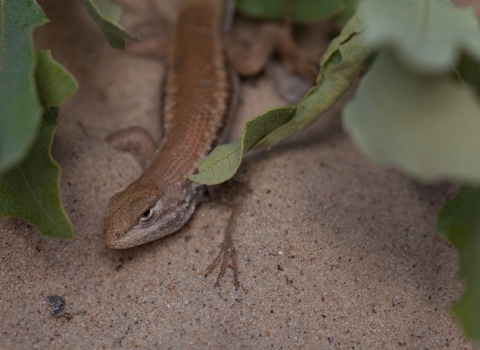The U.S. Fish and Wildlife Service is seeking public comment on a draft environmental assessment and draft habitat conservation plan for the proposed issuance of an incidental take permit for the Bellefield Solar Energy Project in Kern County, California. 8minute Solar Energy applied for the permit, which, if approved, would cover incidental take of the desert tortoise during construction, operation, maintenance and decommissioning of the solar facility over 45 years.
The desert tortoise lives in a variety of habitats from sandy flats to rocky foothills, but spends up to 95% of its life underground. Approximately five desert tortoises occur on the 8,071-acre project site.
The draft conservation plan describes measures 8minute Solar Energy would take to minimize and mitigate the project’s potential impact on the desert tortoise population. Minimization measures include translocating desert tortoises found prior to construction to secure off-site locations. Mitigation measures include funding enhancement of desert tortoise habitat within a retired grazing allotment.
The mitigation aspect of the habitat conservation plan uses a key conservation agreement known as the Durability Agreement between the Bureau of Land Management (BLM) and California Department of Fish and Wildlife, providing innovative tools to manage impacts to wildlife and their habitats in California. Under this plan, 8minute Solar Energy will fund enhancements for desert tortoise habitat on public lands managed by the BLM.
“The U.S. Fish and Wildlife Service works to promote wildlife conservation while supporting infrastructure and economic development,” said Scott Sobiech, Field Supervisor for the Carlsbad and Palm Springs Fish and Wildlife offices. “This mitigation strategy is a showcase for future cooperation among agencies and private companies that promotes recovery of the species.”
The Service regularly engages with industry groups to identify innovative strategies for conserving and recovering at-risk species found within a project area, and has a demonstrated history of successful working relationships with solar companies. Since 2008, the Service has been working with solar companies to minimize the risk to desert tortoises. These measures have included modifying the boundaries of projects to protect important habitat and movement corridors, constructing and maintaining head-starting facilities, and fencing highways to reduce mortality of desert tortoises.
The notice is available today in the Federal Register reading room. Copies of the draft environmental assessment and draft habitat conservation will be available at https://www.regulations.gov by searching Docket Number FWS-R8-ES-2022-034.
Comments on the draft documents will be accepted until May 25, 2022. You may submit comments in writing by either of the following methods:
- Internet: https://www.regulations.gov. Search for and submit comments on Docket No. FWS-R8-ES-2022-0034.
- U.S. mail: Public Comments Processing, Attn: Docket No. FWS-R8-ES-2022-0034; U.S. Fish and Wildlife Service Headquarters, MS: PRB/3W; 5275 Leesburg Pike; Falls Church, VA 22041–3803.
The U.S. Fish and Wildlife Service works with others to conserve, protect, and enhance fish, wildlife, plants, and their habitats for the continuing benefit of the American people. For more information about our work and the people who make it happen, visit www.fws.gov/cno or connect with us via Facebook, Twitter, YouTube and Flickr.



